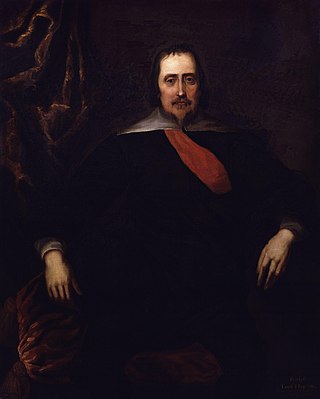Robert Hopton may refer to:
- Robert Hopton (died 1638), English politician, MP for Shaftesbury, and for Somerset
- Robert Hopton (died 1590), MP for Mitchell
- Robert Hopton (MP for Wallingford), see Wallingford (UK Parliament constituency)
Robert Hopton may refer to:

Ralph Hopton, 1st Baron Hopton was an English politician, military officer and peer. During the First English Civil War, he served as Royalist commander in the West Country, and was made Baron Hopton of Stratton in 1643.
Hopton may refer to:
Robert Knollys may refer to:
Sir John Ernle was an English politician who sat in the House of Commons at various times between 1654 and 1695. He was one of the longest-serving Chancellors of the Exchequer, a position he held from 2 May 1676 to 9 April 1689.
John Hervey may refer to:
John James may refer to:
Robert Carswell may refer to:

Edmund Dunch of Little Wittenham, Berkshire and Down Ampney, Gloucestershire, was an English Whig politician who sat in the English and British House of Commons between 1701 and 1719.

Cockfield Hall in Yoxford in Suffolk, England is a Grade I listed private house standing in 76 acres (31 ha) of historic parkland, partly dating from the 16th century. Cockfield Hall takes its name from the Cokefeud Family, established there at the beginning of the 14th century. It was purchased by Jon Hunt in 2014 to form part of his Wilderness Reserve offering exclusive rural holiday accommodation.
John Bernard may refer to:
Robert, Rob, Bob, or Bobbie Knight may refer to:

Sir Owen Hopton was an English provincial landowner, administrator and MP, and was Lieutenant of the Tower of London from c. 1570 to 1590.
Edward Chamberlain may refer to:

Sir Baynham Throckmorton, 3rd Baronet of Clearwell, Gloucestershire was an English politician who sat in the House of Commons at various times between 1656 and 1679.
John Burgh may refer to:
Robert Hopton (c.1575–1638) was an English landowner and politician who sat in the House of Commons in two parliaments between 1604 and 1622.
John Stoke may refer to:
Richard Houghton or Hoghton may refer to:
The battle of Babylon Hill was an indecisive skirmish that took place between Royalist and Parliamentarian forces near Yeovil, in South West England, on 7 September 1642, during the early stages of the First English Civil War. The engagement occurred after a failed Parliamentarian siege of nearby Royalist-held Sherborne. After the Parliamentarians had retreated to Yeovil, a force of around 350 Royalists was sent to reconnoitre their movements. Under the command of Sir Ralph Hopton, the Royalist detachment established itself on Babylon Hill, on the outskirts of Yeovil.

Sir Philip Gell, 3rd Baronet of Hopton Hall near Wirksworth, Derbyshire was a lead-mining magnate and an English politician.